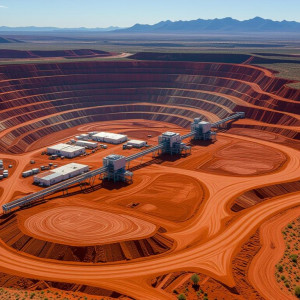Why Freeport-McMoRan Is the Unstoppable Force in the Copper Tariff Era

The Trump administration's newly announced 50% tariff on copper imports, set to take effect August 1, 2025, has turned the U.S. copper market into a battleground. While the move aims to boost domestic production and reduce reliance on foreign imports--nearly half of which come from Chile--the policy has created a structural advantage for one company: Freeport-McMoRan (FCX). Freeport's dominance in U.S. copper production is staggering.
The company accounts for 70% of the nation's refined copper output, with mines like the Morenci operation in Arizona (the largest U.S. copper mine at 400,000 tons annually) forming the backbone of its domestic footprint. This scale isn't just about volume--it's about control over the supply chain at a time when tariffs are weaponized to protect domestic industries. 
The Structural Barriers Protecting Freeport
The copper tariff isn't just a temporary tax--it's a strategic barrier to foreign competition.
Here's why Freeport[1] stands to win:
- The COMEX-LME Premium:
U.S. copper prices on the COMEX exchange now trade at a 13% premium over London Metal Exchange (LME) prices, up from zero in 2023. This gap reflects the tariff's immediate impact, making imported copper 13% more expensive. For Freeport, this is pure profit: every £0.10 per pound premium adds £135 million to annual EBITDA.
-
Cost Advantages:
Freeport's U.S. operations have a £1.50 per pound net cash cost--well below global peers.Its Indonesian Grasberg mine, now with a new smelter, reduces third-party processing fees, further lowering costs. Meanwhile, U.S. tax incentives and royalty exemptions (absent for imports) amplify margins.
-
Geographic Lock-In:
The tariff's 50% rate effectively blocks cheaper imports. With global copper production concentrated in politically unstable regions (Chile, Peru, Indonesia), U.S. buyers face a stark choice: pay more for imports or rely on Freeport's domestic supply.
Freeport's Playbook to Exploit the Tariff
The company isn't just sitting on its lead.
Freeport is actively expanding capacity and diversifying its revenue streams:
- Leach Technology: A new program targets extracting copper from low-grade stockpiles, aiming for 300 million pounds annually by year-end and 800 million by 2028. This could double U.S. production without new mines.
- Grasberg Smelter: Despite delays, this £2 billion project will cut costs by eliminating external smelting fees, freeing up capital for U.S. investments.
- Strategic Partnerships: A £75M earn-in with C3 Metals for the Bellas Gate project in Jamaica adds long-term reserves while spreading geopolitical risk.
Analysts at Morgan Stanley[2] and JPMorgan[3] have already raised their price targets to £56 (up from £42) and £48.26, respectively, citing Freeport's tariff-driven EBITDA upside. The stock's valuation is 5.8% below these targets, making it a compelling buy.
Risks?
Yes, But Manageable
Critics point to challenges:
- Indonesia's Political Risks: The Grasberg mine is a geopolitical flashpoint. However, Freeport's 2023 agreement to boost local refining capacity has eased tensions.
- Water Scarcity: South American mines face droughts, but Freeport's U.S. operations are less vulnerable.
- Regulatory Hurdles: The Section 232 tariff faces legal challenges, but its alignment with Trump's "America First" strategy makes it politically insulated.
Conclusion: Buy Freeport--This Tariff Isn't Going Anywhere
The copper tariff is a structural shift, not a temporary blip. With global supply chains fraying and the U.S. desperate to secure critical minerals, Freeport's position as the "America's Copper Champion" is unassailable.
Investors should buy FCX now. The stock trades at £45.50, below even the conservative consensus target of £48.26. The 25% premium in COMEX prices (and counting) is just the beginning.
Recommendation: Buy Freeport-McMoRan[4]. The tariff era is here--and Freeport is the only game in town. Disclaimer: This analysis is for informational purposes only.
Always consult a financial advisor before making investment decisions.
References
- ^ Freeport (www.ainvest.com)
- ^ Morgan Stanley (www.ainvest.com)
- ^ JPMorgan (www.ainvest.com)
- ^ Freeport-McMoRan (www.ainvest.com)